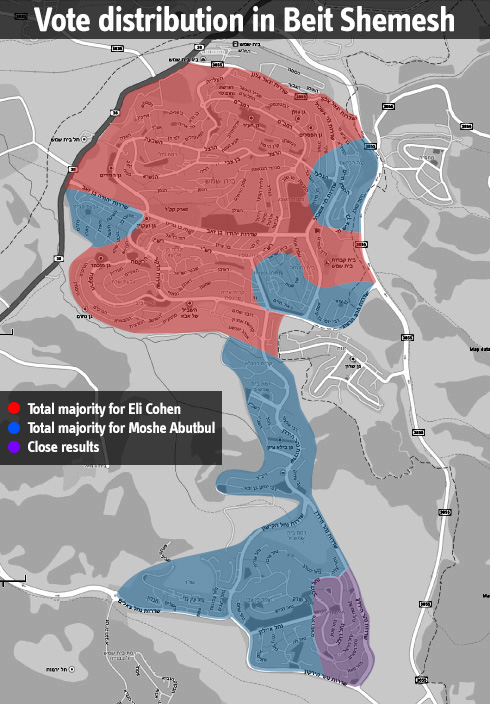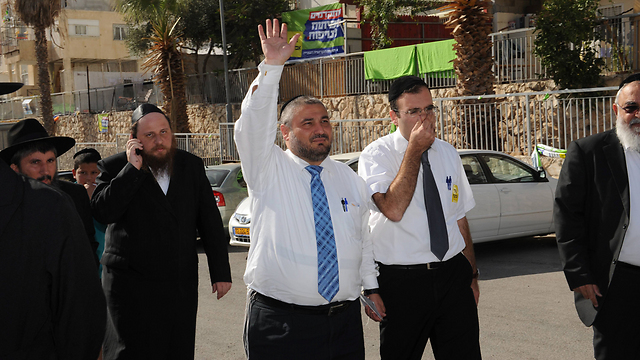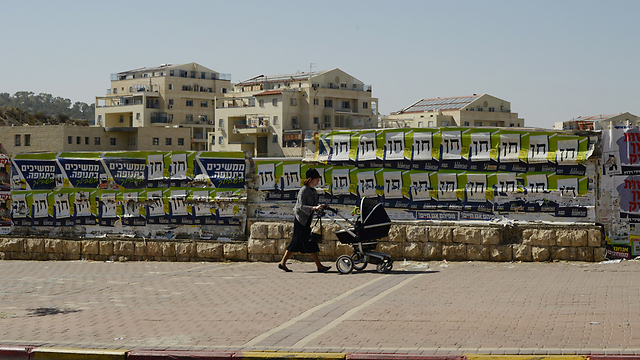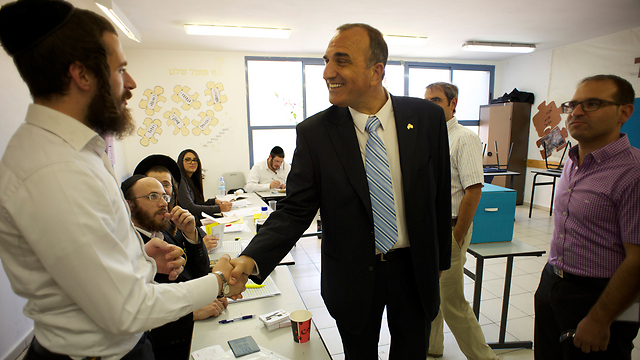Following the victory of the haredi candidate in the Beit Shemesh mayoral race, Moshe Abutbul (Shas), secular and national religious residents will hold a demonstration on Thursday evening calling to divide the city in two.
Protestors are also irked by what they call "fraud in the local election," based on a police raid on two haredi apartments on election day, in which officers confiscated hundreds of ID cards belonging to citizens currently residing abroad. An investigation into their possible use in the elections has been launched.
Related stories:
- Disappointment in Beit Shemesh
- Beit Shemesh mayoral race reflects conflicts
- Woman attacked for dressing 'immodestly'
Secular protestors are organizing a motorcade which will leave the Orot Banot school at 7 pm headed to the Beit Shemesh commercial center. According to them, they do not wish to foment violence but to show the presence of the city's non-haredi public.
(Google maps)
Sigal, a national-religious resident who plans to participate in the demonstration, told Ynet: "We believe the victory wasn't kosher. The haredim are taking over the city, and that means future neighborhoods being built will be allotted to the haredi population.
"The city is becoming more and more haredi, and the public sphere is changing: exclusion of women, bus segregation, modesty notices on the streets, separate clinics and burning Israeli flags on Independence Day. This is religious terror. I feel unwanted in my city. Election day was a day of mourning for us."
The Na'ama Margolis incident
Tensions between haredi and other sectors in Beit Shemesh have been simmering for two decades, but only gained national attention late 2011, with the Na'ama Margolis incident, when members of an extreme haredi sect spat on Margolis, a child on her way to school, because they deemed her outfit unchaste.
Winner Moshe Abutbul (Photo: Herzl Yosef)
Changing demographics (Photo: Yuval Chen)
Loser Moshe Cohen (Photo: Yuval Chen)
Though the sect is a minority in the city, the incident caused tensions to boil over and opened up a two-year long fiery debate over women's exclusion and fund allocation by the municipality.
However, by the end of the tumultuous election campaign viewed by many residents as a critical fight over the identity of their city, incumbent mayor Abutbul triumphed over his opponent Eli Cohen,
representing both the secular and national religious sectors, with a solid five point margin.
Abutbul's win is the expected outcome of the demographic process Beit Shemesh – like other cities in Israel – is going through since the 90s. Until then, the decisive majority of the city's population was on the secular-traditional-national religious spectrum, with a haredi minority. But in the last 20 years many
haredim moved in and now form almost half the population.
By 2008 the non-haredi camp failed to rally around one candidate, and Abutbul became the city's first haredi mayor.
"We live in a democratic country, so people should either accept the results or keep moaning," Abutbul said on Wednesday, after the results were out.
"Beit Shemesh is simply going through a demographic change. I intend to keep leading the city in a way of unity, friendship and a round table. Everyone is invited to join the coalition."
Who will divide the city
Abutbul reiterated his commitment to all the city's sectors, but his detractors claim that in the last five years he attended only to the haredim and ignored extremists' acts of violence.
Two years ago, against the backdrop of apparent increasing difficulties to find a middle ground which will allow haredim and others to live side by side, Prime Minister Benjamin Netanyahu raised the possibility of dividing the city in two.
His suggestion encountered overwhelming opposition from both sides of the political map, some claiming the idea marks the complete bankruptcy of the Zionist ideal. Moshe Gafni (United Torah Judaism) said: "Maybe we should divide the whole country according to citizens and olim, religious and seculars,
Sephardic and Ashkenazi, Arabs and Jews?"
Some held to less ideological grounds. In an interview with the haredi radio channel Kol Barama, then Interior Minister Eli Yishai dismissed the suggestion and explained that such a division will create an unsustainable haredi city bereft of revenue.
Ahead of Thursday evening's demonstration Yisrael, 34, a secular resident of Beit Shemesh said: "The meaning of being secular in Beit Shemesh these days is that some parts of the city are closed to us. I had to buy something and the shop nearby was closed, so I went to Ramat Beit Shemesh. But they didn't want to serve me because I was wearing Bermuda shorts. I had to ask the shop assistant in the shop next door to buy it for me.
"It seeps into secular areas as well, where they now ask to wear modest clothing. Some 15 years ago we sat in an open pool on the Sabbath and heard music, and today Beit Shemesh is a pile of trash and frogs."
- Receive Ynetnews updates
directly to your desktop



















